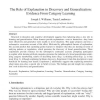Free Online Productivity Tools
i2Speak
i2Symbol
i2OCR
iTex2Img
iWeb2Print
iWeb2Shot
i2Type
iPdf2Split
iPdf2Merge
i2Bopomofo
i2Arabic
i2Style
i2Image
i2PDF
iLatex2Rtf
Sci2ools
COGSCI
2010
2010
The Role of Explanation in Discovery and Generalization: Evidence From Category Learning
Research in education and cognitive development suggests that explaining plays a key role in learning and generalization: When learners provide explanations--even to themselves--they learn more effectively and generalize more readily to novel situations. This paper proposes and tests a subsumptive constraints account of this effect. Motivated by philosophical theories of explanation, this account predicts that explaining guides learners to interpret what they are learning in terms of unifying patterns or regularities, which promotes the discovery of broad generalizations. Three experiments provide evidence for the subsumptive constraints account: prompting participants to explain while learning artificial categories promotes the induction of a broad generalization underlying category membership, relative to describing items (Exp. 1), thinking aloud (Exp. 2), or free study (Exp. 3). Although explaining facilitates discovery, Experiment 1 finds that description is more beneficial for le...
Related Content
| Added | 09 Dec 2010 |
| Updated | 09 Dec 2010 |
| Type | Journal |
| Year | 2010 |
| Where | COGSCI |
| Authors | Joseph J. Williams, Tania Lombrozo |
Comments (0)

